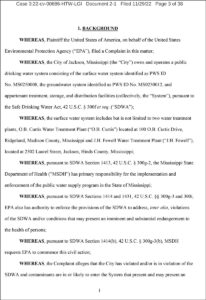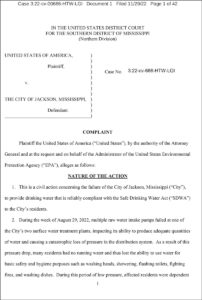JACKSON, Miss.—The U.S. Department of Justice is establishing an “interim third party manager” for the City of Jackson’s beleaguered water system. That manager is charged with stabilizing Jackson’s water production and distribution facilities and bringing the capital city back into compliance with the Safe Drinking Water Act.
The order places Jackson’s water-treatment system and its Water Sewer Business Administration, which handles billing, under the management of Edward “Ted” Henifin. He was previously the general manager of the Hampton Roads Sanitation District and once the director of public works for Hampton, Va. Mayor Chokwe A. Lumumba and the Jackson City Council agreed to the terms of the order earlier this month.

The DOJ’s intervention follows two consecutive years of severe water crises for Jackson. In 2021, a winter freeze kicked off a month without water for many residents as the City struggled to refill its damaged distribution system. This year, flooding exacerbated critical staffing shortages and accrued maintenance failures at the O.B. Curtis Water Treatment plant demanded immediate intervention to prop the system up.
In both instances, Jackson residents went for weeks without reliable access to safe running water.
Numerous ‘Priority Projects’ Ahead
The DOJ order empowers Henifin to “operate, maintain, manage and control” Jackson’s water system as well as its water and sewer billing authority, and to realize capital-improvement projects necessary to repair the system. Henifin and the agents of the interim third-party manager, or ITPM, have full access to the system’s records, authority over its operations and freedom to terminate or modify any of the city’s contracts, as well as enter into any new contracts as needed.
Henifin has been involved with the operations of O.B. Curtis and J.H. Fewell in his role at the Unified Command structure established this year after the resurgent collapse of the water system. Henifin, with four decades of public-service experience, has been on loan to the city’s water treatment facilities since September.
Assistant Attorney General Todd Kim wrote in a memorandum supporting Henifin’s appointment that “his ability to immediately engage the problems facing the City’s drinking water system makes him particularly well-suited for this temporary role of ITPM.”
First, Financial Management
The first goal of Jackson’s new water authority is to “develop, within sixty days of the Effective Date, through a professional financial advisor, a Financial Management Plan for the System and WSBA that takes into consideration the short-term (12-18 Months), mid-term (1.5 to 5 years), and long-term (more than 5 years) operation and maintenance and capital improvement funding needs.”
Beyond that plan, the order contains 13 “priority projects” that constitute outstanding challenges for Jackson’s water system.
- First, an operations and management contract that establishes “minimum appropriate staffing,” one of the most critical issues facing plants like O.B. Curtis today.
- The winterization of O.B. Curtis and J.H. Fewell, including membrane winterization, in preparation for events like the 2021 crisis in which freezing temperatures shut down the system.
- A comprehensive solution for “optimized corrosion control treatment,” a constant challenge for the City of Jackson, and one that has risked contaminations of lead and copper in years past.
- An “Alternative Water Source Plan” like the one Director of Enforcement and Compliance for EPA Region Four Carol Kemker warned the Mississippi Free Press that the City had failed to implement shortly before the 2022 collapse of the water system.
- A full distribution study, encompassing various elements of the water system: a proposed asset-management system; water-loss detection and reduction; a pressure study; an inventory of remaining lead lines and removal plans; and other requirements.
- A plan to stabilize the water system on a sustainable basis, including “sustainable revenue models, appropriate levels of renewal and replacement, asset management plan, service levels, water demand modeling, and other related factors.”
- Improvements to the plants’ supervisory control and data acquisition (SCADA) system, which allows for remote and automated control of water treatment that previous system leadership have acknowledged is lacking at the plants.
- Assessment and repair of chemical systems at plants and wells—previously, plants have lacked instrument technicians necessary to continuously calibrate and maintain delicate sensors and automation systems.
- Chlorine system improvements that will eventually invalidate the use of outdated gaseous chlorine treatment at O.B. Curtis.
- Assessment and repair of intake structures, some related to previously mentioned detection and automation systems. These structures also include the raw water screens that constituted part of the failure of O.B. Curtis in 2021’s freeze.
- Evaluation and redundancy restoration for a wide range of processes and units at both treatment plants to ensure continued operation even in the case of future maintenance failures.
- Sludge assessment in finished water storage facilities. Sludge buildup was another contributing factor to 2021’s post-freeze delay in water production.
- Assessment of power vulnerabilities in the water system and a plan to address them.
The ITPM “shall immediately commence work in accordance with the schedule,” the DOJ order explains. That schedule is expected in the hands of EPA and MSDH only seven days after the ITPM receives its funding. The City of Jackson must fund the ITPM to the tune of just under $16 million yearly, with additional funds coming from grants, loans and other financial assistance, including from the EPA.
The ITPM has one distinct set of limitations to its broad authority—it cannot “encumber or sell any real property asset” of Jackson, nor “propose or agree to consolidate the System with any other public or private utilities (or) authorize another governmental agency to operate a public water system within the System’s current service areas.” It also cannot apply for a loan greater than the financial management plan’s debt capacity.
Regan: Jackson Should Have ‘Ultimate Ownership’
These restrictions follow from EPA Administrator Michael S. Regan’s earlier statements that Jackson should maintain ultimate ownership of its water system, putting aside potential plans for a full privatization or consolidation of Jackson’s water-treatment facilities.

Beyond those restrictions, the ITPM has a high degree of autonomy to alter contracts, order improvements, and reorganize Jackson’s water system. For example, while the ITPM must attempt first to pass any proposed water rate increases through the Office of the Mayor and the Jackson City Council, if the council votes down a rate increase, and it has been a full year since the last adjustment, ITPM may unilaterally adjust the City’s water rates.
Indeed, Henifin and the ITPM’s records are not subject to full public scrutiny. “Records maintained or in the custody of the ITPM are not public records subject to public records laws,” the order states. However, the ITPM will be required to establish a website to inform the public of its work, post requests for proposals and share all other information deemed necessary in the ITPM’s “reasonable judgment.”
U.S. Attorney General Merrick B. Garland addressed the adoption of the interim order on Nov. 29.
“Today the Justice Department is taking action in federal court to address long-standing failures in the City of Jackson’s public drinking water system,” Garland said. “The Department of Justice takes seriously its responsibility to keep the American people safe and to protect their civil rights. Together with our partners at EPA, we will continue to seek justice for the residents of Jackson, Mississippi. And we will continue to prioritize cases in the communities most burdened by environmental harm.”
‘In Every Zone of the City’
Accompanying the order is a DOJ complaint that exhaustively details the City of Jackson’s Safe Drinking Water Act violations over recent years.
The complaint finds that reported water-line breaks from 2017 to 2021 exceeded 7,300. “These line breaks occurred at an average annual rate of 55 breaks per 100 miles of line per year,” the complaint states. “By comparison, one industry benchmark goal is no more than 15 breaks per 100 miles of line per year.”
The complaint acknowledges that, while line breaks occur “in every zone of the City,” it identified North Jackson and Seneca Street as the location of especially high numbers of breaks, a pattern it credits to “locations where small-diameter, pre-1910 cast iron pipe is in use.”
The complaint identifies over 320 boil-water notices for Jackson since May 1, 2020. Eighty of those surface-water boil-water notices were systemwide, a pattern of consistent failure to provide safe drinking water. The vast majority of these events, the complaint concludes, were due to low pressure in the distribution system.

Included in the complaint are seven claims for relief with specific allegations detailing the City of Jackson’s water-system violations.
The DOJ’s primary claim is that “one or more contaminants,” ranging from simple sediment to dangerous pathogens, “is present in or is likely to enter the System, which may present an imminent and substantial endangerment to the health of persons.” Reasserted in this claim are the manifest issues in the City’s water system, from consistent line breaks and boil water notices to chronic staffing shortages and lack of routine maintenance. “State and local actions have been insufficient to prevent the threat of additional failures in the System,” the claim concludes.
Insufficient Class A Water Operators
Next, both of the City’s water treatment plants lack sufficient Class A operators. All water treatment plants must have a Class A operator present to operate. The complaint details a period this year from June 5 to July 2 in which on 15 separate occasions “J.H. Fewell did not have a certified Class A operator onsite.” The complaint also details the extreme working conditions facing qualified staff, including countless hours of overtime.
The complaint also alleges that Jackson has failed to properly implement an alternative water source plan, in “at least one gallon (of alternatively sourced water) per day, per person … be made available at no cost to every person served by the System, as needed for drinking, cooking, maintaining oral hygiene, and dishwashing.”
Previously, Mayor Chokwe A. Lumumba told this reporter that this was merely a “technical violation,” in which the City was using donations for its alternative water. “We didn’t have a contract in place, but were receiving the donations to meet the need … we didn’t have a contract, but the reality is that we were providing that water.”
The complaint, however, alleges seven separate instances in which the City issued boil-water notices demanding alternative water but did not provide it, comprising a total of 43 days over the last two years in which Jackson residents lacked safe drinking water and the City failed to provide alternatives.
The complaint details consistent exceedances of turbidity limits—a measure of the cloudiness of the water in the distribution system, and the primary signal that improper treatment may be allowing dangerous contaminants into the water supply. One out of every four samples from O.B. Curtis in February 2021 showed unacceptably high turbidity.

Additional claims include allegations that the City failed to rehabilitate filters at J.H. Fewell in a timely manner, that the City has failed to install proper corrosion-control procedures following 2015 lead exceedances and that the City’s water system has shown excessive levels of “haloacetic acids five,” or HAA5—disinfection byproducts resulting from chlorine treatment.
Statewide, National Leadership React
EPA Administrator Michael S. Regan, who has repeatedly visited Jackson over the course of his tenure in office, expressed his hope that the new order in Jackson would finally mend the broken system.
“I pledged that EPA would do everything in its power to ensure the people of Jackson have clean and dependable water, now and into the future,” Regan wrote in a statement. “While there is much more work ahead, the Justice Department’s action marks a critical moment on the path to securing clean, safe water for Jackson residents.”

Last week, at a Jackson State University event, Mayor Lumumba signaled his support for the content of the order, which had yet to be released to the public.
“The agreement considers our challenges,” he said then. “It recognizes the deficits and what has contributed to the issues here in Jackson. We believe that it is the best way to comprehensively address (the water system).”
But the order, the mayor said, was not a panacea. “It’s a marathon, right? There’s a long road ahead.”
Even as Gov. Tate Reeves celebrated the agreement on social media, and pledged $240,000 of state funds to assist the transition, he accused the mayor of “undermining the EPA’s request for the state to find a maintenance contract for the city.”
“It is excellent news for anyone who cares about the people of Jackson that the Mayor will no longer be overseeing the city’s water system,” he said in a written statement. “It is now out of the city’s control, and will be overseen by a federal court.”






